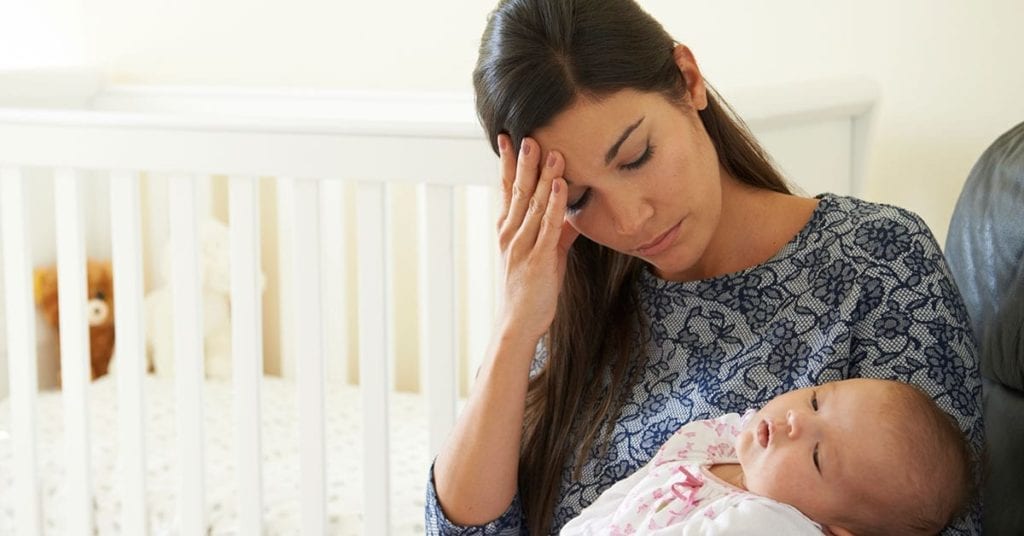The birth of a baby is a joyful event but it always brings unexpected challenges for new parents. These are typically overcome in time as the family gets used to a new routine, but the adjustment isn’t easily made for some – especially new mothers who experience postpartum depression.
Postpartum depression is a mood disorder that can affect women after childbirth. While many women experience fatigue and feel worried about their newly acquired role, mothers with postpartum depression experience extreme feelings of sadness, anxiety, and exhaustion that may make it difficult for them to complete daily care activities for themselves or for others, according to the National Institute of Mental Health (NIMH).
The affliction does not have a single cause, the NIMH says, but likely results from a combination of physical and emotional factors.
Symptoms
Common symptoms of postpartum depression in new mothers can include:
- Feeling sad, hopeless, empty, or overwhelmed
- Crying more often than usual or for no apparent reason
- Worrying or feeling overly anxious
- Feeling moody, irritable, or restless
- Oversleeping, or being unable to sleep even when her baby is asleep
- Having trouble concentrating, remembering details, and making decisions
- Experiencing anger or rage
- Losing interest in activities that are usually enjoyable
- Suffering from physical aches and pains, including frequent headaches, stomach problems, and muscle pain
- Eating too little or too much
- Withdrawing from or avoiding friends and family
- Having trouble bonding or forming an emotional attachment with her baby
- Persistently doubting her ability to care for her baby
- Thinking about harming herself or her baby
Source: National Institute of Mental Health
Risk factors
Women who are at greater risk for developing postpartum depression generally have one or more risk factors, such as:
- Symptoms of depression during or after a previous pregnancy
- Previous experience with depression or bipolar disorder at another time in her life
- A family member who has been diagnosed with depression or other mental illness
- A stressful life event during pregnancy or shortly after giving birth, such as job loss, death of a loved one, domestic violence, or personal illness
- Medical complications during childbirth, including premature delivery or having a baby with medical problems
- Mixed feelings about the pregnancy, whether it was planned or unplanned
- A lack of strong emotional support from her spouse, partner, family or friends
- Alcohol or other drug abuse problems.
Source: National Institute of Mental Health
Why does Postpartum Depression happen?
Occurring in nearly 15% of births, postpartum depression may begin shortly before or any time after childbirth, but commonly begins between a week and a month after delivery. It does not occur because of something a mother does or does not do.
As levels of the hormones estrogen and progesterone in a woman’s body quickly drop after childbirth, the resulting chemical changes that occur in her brain may trigger mood swings. In addition, many mothers are unable to get the rest they need to fully recover from giving birth. Constant sleep deprivation can lead to physical discomfort and exhaustion, which can contribute to the symptoms of postpartum depression.
Getting help
Treatment for postpartum depression may include counseling/talk therapy, which involves interacting on a one-to-one or group basis with a counselor, therapist, psychologist or social worker. Both cognitive therapy, which helps people recognize and change their negative thoughts and behaviors, and interpersonal therapy, which helps people understand and work through problematic personal relationships, have been found effective in treating postpartum depression.
Medication, such as antidepressants, has also been found to be effective.
These treatment methods can be used alone or together.
The professionals at Advantage Mental Health Center encourage any woman who feels she may have postpartum depression to seek treatment as they would for any other medical condition.
Advantage Mental Health Center is a child-friendly office, so your baby and other children are welcome at your appointments. The center has private waiting rooms with TVs and toys, and caring staff will make sure you and your children are comfortable so you can be the focus of the appointment and get the help you need.
True postpartum depression won’t just go away. If you, or a loved one, are experiencing symptoms, you need to talk to someone who can diagnosis it and help you, or your loved one, get through it. Contact the professionals at Advantage Mental Health Center at (727) 240-3103.


